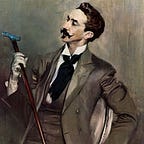Space, Experience and the Bourgeoisie in Michel Butor’s Second Thoughts
I keep finding that the human experience has perhaps not changed that much in the last few decades upon finishing novels from other eras. This time, I verified it through reading the 1957 Michel Butor novel Second Thoughts (La modification). Second Thoughts is, at its simplest, a novel about adultery: a middle-aged Frenchman travels to Rome to cheat on his wife. Cheating very much still occurs today, but the description of it is certainly not the most interesting feature of this novel. Like other well-known French novels, such as Flaubert’s Madame Bovary or Mauriac’s Thérèse Desqueyroux, Second Thoughts transforms a rather ordinary event into an occassion for skillful literary experimentation and for commentary on the bourgeois capitalist lifestyle of postwar Western Europe. I invite you to explore how Butor found in a troubled man an opportunity to play around with form and speak on space and the bourgeoisie.
Form
Psychological novels were not a particularly novel concept during Butor’s time, but his particular use of language certainly brought something new to the table. Second Thoughts is, unlike the vast majority of novels, written in the second person — the vous form, to be precise. The repercussions of this choice are quite interesting: first, one feels as if one has become the protagonist, the anxious middle-aged Frenchman afraid to confront both his wife and his mistress over his feelings of alienation. Butor’s minute descriptions of all the objects and people around the protagonist further help us feel as if we are him, observing and thinking through his body.
Additionally, Butor’s use of all the range of verbal tenses makes reading the novel an even more fascinating experience. You will do or you did as Butor says, you’re complicit in the love affair with Cécile and the disappointing past experiences with Henriette. You are integrated into his conception of time.
Space
The place of space in the novel is significant. First, the protagonist comes to realize by the end that he has “fallen in love” with his mistress Cécile not because of any quality unique to her but rather because he enjoys the experience of the city of Rome when he hangs out with her there during work trips. Likewise, his wife Henriette back in Paris has become as gray and cold as the city fo Paris itself. This understanding of people as inherently linked to spaces and experiences might remind us a little of Proust, who likewise linked geography to the human mind, for example, when he grieved the loss of his grandmother only after coming to the town where he last spent time with her while she was healthy. In other words, our brain inevitably associates human beings to space, time or experience subconsciously and reacts in unexpected ways when these are altered — such as the protagonist imagining Cécile becoming as gloomy as Henriette if she were to move to Paris with him.
It’s worth mentioning too that all of the plot happens as the protagonist takes an eight-hour train from Paris to Rome. The natural, rural and urban landscapes and the people he sees along the way are not merely background images but rather a way for him to cope with his anxiety. Some of the best ways to get to know his way of thinking are the little fragments of his imagination we get to see when he makes up stories for the people aboard the train (she imagines a lonely aunt taking care of his sick nephew, and predicts a couple of lovers will have a delightful honeymoon somewhere in Southern Italy). These descriptions make the text denser than one would think for a relatively short span of time. Butor wants you to see or feel everything the protagonist comes across.
The Bourgeoisie
A biting critique of the bourgeois lifestyle is at the heart of the novel. The protagonist is clearly fatigued by his upper-middle class Parisian lifestyle, one that includes a well-paid but uninteresting office job, a wife who’s not exciting to be around and four children with whom he does not get along that well. He gets to feel liberated from this structure when he travels to Rome to see Cécile, who takes him to lesser known spots around the city and takes him out to eat Roman cuisine. If Cécile were to move to Paris, he thinks, she would become simply another woman like his wife, another uninteresting Parisian. It is because of this that he decides while riding the train — even though we do not get to see what happens after his arrival to Rome — that he will not have her move to Paris with him after all as he had been planning for the last few weeks.
Cécile constantly reminds him that he is afraid to leave his wife and live with her instead due to his bourgeois, religious education that forbids divorce. Furthermore, she refuses to visit the Vatican while in Rome because it reminds her of the Church — the institution holding back his lover from living with her. Nonetheless, Cécile does not know that perhaps cohabitation or monogamy is just as bourgeois and conformist as marriage. In addition to the more obvious critique of the tediousness of work and the monotone nuclear family, the novel is perhaps questioning the conformity involved in traditional human relationships. Does making things “official’ change relationships?
Second Thoughts is merely a mental exercise, so we cannot tell what would’ve become of this couple. Yet Butor started us off with an interesting question, especially considering his era was slightly more conservative than ours surrounding marriage and monogamy.
